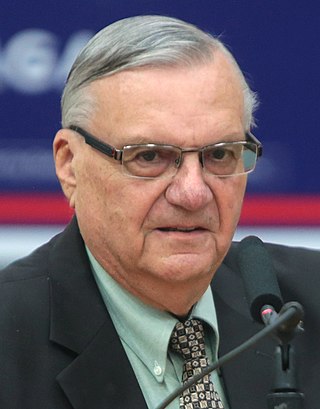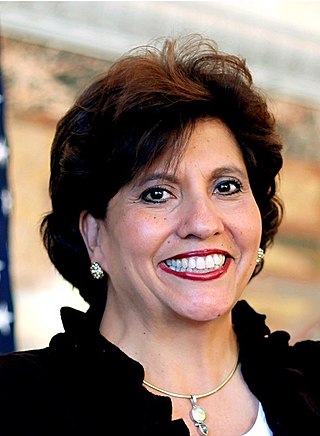Obstruction of justice, in United States jurisdictions, is an act that involves unduly influencing, impeding, or otherwise interfering with the justice system, especially the legal and procedural tasks of prosecutors, investigators, or other government officials. Common law jurisdictions other than the United States tend to use the wider offense of perverting the course of justice.
Thomas Liddy is an American attorney and political candidate in Maricopa County, Arizona. He is the son of the Watergate figure G. Gordon Liddy.
Abuse of power or abuse of authority, in the form of "malfeasance in office" or "official abuse of power", is the commission of an unlawful act, done in an official capacity, which affects the performance of official duties. Malfeasance in office is often a just cause for removal of an elected official by statute or recall election. Officials who abuse their power are often corrupt.

Joseph Michael Arpaio is an American former law enforcement officer, politician, and conspiracy theorist. He served as the 36th Sheriff of Maricopa County, Arizona for 24 years, from 1993 to 2017, losing reelection to Democrat Paul Penzone in 2016.

Richard Anthony Paez is a senior United States circuit judge of the United States Court of Appeals for the Ninth Circuit.

Andrew Peyton Thomas is an American politician, author and former attorney. He was the county attorney for Maricopa County in Arizona from 2004 until April 6, 2010. During his term in office, he was known for his anti-illegal immigrant policies. On April 10, 2012, Thomas was disbarred by a disciplinary panel of the Arizona State Supreme Court for his actions as county attorney.
Larry Elliot Klayman is an American attorney, right-wing activist, and former U.S. Justice Department prosecutor. He founded both Judicial Watch and Freedom Watch.

Emmet Gael Sullivan is an American attorney and jurist serving as a senior United States district judge of the United States District Court for the District of Columbia.

Susan Marie Ritchie Bolton is a senior United States district judge of the United States District Court for the District of Arizona.

Mary Helen Murguia is an American lawyer and jurist serving as Chief United States circuit judge of the United States Court of Appeals for the Ninth Circuit. Her chambers are located in Phoenix, Arizona. She previously served as a U.S. district judge of the United States District Court for the District of Arizona from 2000 to 2011.

Grant Murray Snow is an American lawyer and jurist who serves as Chief U.S. district judge of the United States District Court for the District of Arizona. Snow was previously a state court judge on the Arizona Court of Appeals from 2002 to 2008.

Neil Vincent Wake is a senior United States district judge of the United States District Court for the District of Arizona.
The Maricopa County Sheriff's Office (MCSO) is a law enforcement agency in Maricopa County, Arizona that was involved in a number of controversies. It is the largest sheriff's office in the state of Arizona and provides general and specialized law enforcement to unincorporated areas of Maricopa County, serving as the primary law enforcement for unincorporated areas of the county as well as incorporated cities within the county which have contracted with the agency for law-enforcement services. It also operates the county jail system. Elected in 2016, Paul Penzone is the current sheriff of Maricopa County. Penzone replaced Joe Arpaio after his 24-year tenure as sheriff.
Dennis Lee Montgomery is an American software designer and former medical technician who sold computer programs to federal officials that he claimed would decode secret Al-Qaeda messages hidden in Al Jazeera broadcasts and identify terrorists based on Predator drone videos. A 2010 Playboy investigation called Montgomery "The man who conned the Pentagon", saying he won millions in federal contracts for his supposed terrorist-exposing intelligence software. The software was later reported to have been an elaborate hoax and Montgomery's former lawyer called him a "con artist" and "habitual liar engaged in fraud".

Kelli Ward is an American politician who served as the chair of the Arizona Republican Party from 2019 to 2023. She previously served in the Arizona State Senate from 2013 to 2015.

Paul Penzone is an American law enforcement officer. He is the sheriff of Maricopa County, Arizona, United States. Penzone was elected sheriff in 2016, defeating longtime incumbent Joe Arpaio. Penzone is a former sergeant in the Phoenix Police Department.

Executive Order 13768 titled Enhancing Public Safety in the Interior of the United States was signed by U.S. President Donald Trump on January 25, 2017. The order stated that "sanctuary jurisdictions" including sanctuary cities that refused to comply with immigration enforcement measures would not be "eligible to receive Federal grants, except as deemed necessary for law enforcement purposes" by the U.S. Attorney General or Secretary of Homeland Security.
The president of the United States is authorized by the U.S. Constitution to grant a pardon for a federal crime. The other forms of the clemency power of the president are commutation of sentence, remission of fine or restitution, and reprieve. A person may decide not to accept a pardon, in which case it does not take effect, according to a Supreme Court majority opinion in Burdick v. United States. In 2021, the 10th Circuit ruled that acceptance of a pardon does not constitute a legal confession of guilt, recognizing the Supreme Court's earlier language as dicta.












